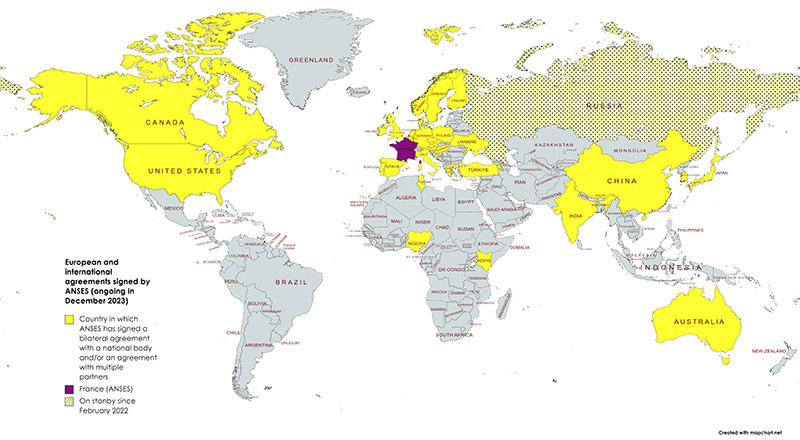Engaging in cooperative actions and partnerships
ANSES takes the European and international dimensions into account in all its activities, by playing an active role in networks of excellence and establishing closer cooperation with many of their members. Through harnessing its expertise, the Agency also implements collaborative capacity building.
European and international exchanges and collaborations with peer organisations of excellence
ANSES nurtures and develops partnerships with organisations of excellence to pool skills and collaborate on expert appraisals, reference work, research, surveillance work and knowledge production. These partnerships are based on criteria of scientific excellence, the size of the agencies and the wider generation of mutual benefits, and involve national agencies and institutions in EU Member States and beyond, in Europe, North America, Asia and elsewhere. The implementation of activities takes different forms, from bilateral cooperation to networks bringing together several institutions, such as the EPIZONE research network working on epizootic animal diseases or the Euphresco network on plant health.

Read about the current partnerships and networks formalised by signed agreements (PDF)
Twinning and cooperation initiatives, and international assistance missions
In line with French priorities and the challenges arising from increased globalisation resulting in more trade and movement of people, the Agency implements cooperation and technical assistance initiatives to improve understanding of other national health situations and support partner countries through various capacity-building activities.
This engagement takes the form of expert appraisal work in third countries, training in France, in third countries or remotely, the hosting of scientific or technical staff within the Agency for variable periods of time, etc.
These initiatives are generally carried out at the request of or in consultation with (and funding from) ANSES’s supervisory ministries and international organisations (e.g. FAO and WOAH, as part of ANSES’s mandates as a collaborating centre or reference laboratory) and in conjunction with French cooperation actors such as France Vétérinaire International (FVI) in the National School of Veterinary Services (ENSV), or FranceAgriMer.
Some ongoing or recently completed EU twinning initiatives:
- Serbia (2016–2019): Strengthening the capacity of veterinary services in the fight against zoonoses, outbreaks of foodborne illness and antimicrobial resistance;
- Azerbaijan (2016–2018): Strengthening the capacity of veterinary services for epidemiological surveillance of animal diseases;
- Lebanon (2018–2022): Strengthening the veterinary and food safety services of the Lebanese Ministry of Agriculture;
- Algeria (2019–2022): Support for the implementation of a quality management approach within the plant protection and technical control services;
- Bosnia and Herzegovina (2020–2024): EU support for capacity building and gradual “acquis” alignment of the veterinary sector in Bosnia and Herzegovina.
- Madagascar (2022-2025): Support for strengthening the system for monitoring and controlling the sanitary and phytosanitary (SPS) quality and compliance of agricultural and agri-food products.
ANSES participation in the WOAH twinning programme
Since 2006, the World Organisation for Animal Health (WOAH) twinning programme has generated mutual benefits to both parent institutions and candidates. These include developing joint research opportunities, establishing research networks and sustainable capacity building.
As part of their mandates as reference laboratories and WOAH collaborating centres, ANSES entities regularly participate in twinning initiatives as part of the WOAH Laboratory Twinning Programme, which seeks to improve global capacity for disease prevention, detection and control.
Ongoing twinning initiatives involving ANSES laboratories and “candidate” institutions:
- WOAH “Brucellosis” twinning initiative between the Maisons-Alfort Laboratory for Animal Health (parent laboratory) and the Central Veterinary Diagnostic Laboratory of Conakry – LCVD, Guinea (candidate laboratory): this began in 2019 to improve capacities in reference diagnosis of brucellosis, in compliance with WOAH international standards. Longer term, the aim is also to develop collaboration between the Guinean and French laboratories;
- WOAH “Rabies” twinning initiative between the Nancy Laboratory for Rabies and Wildlife (parent laboratory) and the Animal Health Research Institute of Taiwan – AHRI (candidate laboratory): this initiative started in 2018 to improve skills in rabies surveillance and reference diagnosis in compliance with WOAH international standards, so that the candidate laboratory can eventually contribute more effectively to the fight against this infection in Taiwan, and more broadly in Asia;
- WOAH “Rabies” twinning initiative between the Nancy Laboratory for Rabies and Wildlife (parent laboratory) and the Institut Pasteur of Tunis – IPT, Tunisia (candidate laboratory): this project started in 2020 to improve capacities in rabies surveillance and diagnosis in compliance with WOAH international standards and to develop appropriate tools for monitoring the immunity of dogs following mass vaccination campaigns.
In the past, twinning initiatives were undertaken with Thailand for brucellosis, China for infectious bursitis disease and Senegal for veterinary medicines.